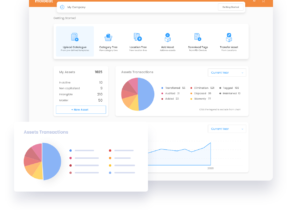What Is an Asset Manager’s Job Description
Whether you’re considering a career as a Fixed Asset Manager (sometime called a Fixed Asset Accountant)– or perhaps you want to employ someone to work in your business and oversee your Fixed Assets? It’s a good idea to check the qualifications required for the job and to fully understand the job description.
In this piece, you’ll find out what a Fixed Asset Manager is responsible for, and the skills required for the role to help you if you’re seeking a career in the enterprise asset management area, or if you’re keen to find someone suitable for your business.

What a Fixed Asset Manager Is Responsible For?
As the job title suggests, a Fixed Asset Manager (or Fixed Asset Accountant) is responsible for managing and monitoring a business’ large assets that cannot easily be converted into cash.
What’s the Difference Between a Fixed Asset Manager and an Asset Manager?
A Fixed Asset Manager is different to an Asset Manager in that the latter could be responsible for commodities, shares, bonds, money, equities, and stock etc. However, some companies employ one person to look after all assets, both fixed and non-fixed.
What Are Fixed Assets?
Fixed Assets are different to assets. Fixed Assets relate to large pieces of equipment or large items, such as computers, software, printers, furniture, property (office building, shops, stores, warehouses etc.), vehicles and machinery (this is not an exhaustive list). Assets are items such as money, stocks, shares, and bonds, etc.
University Courses and Qualifications Required
Different countries have different courses to gain the qualifications needed and some countries even have university courses that are specifically related to Enterprise Asset Management and asset accounting, requiring a degree in the area. There may also be industry graduate training schemes available in your country and certain industry-recognized qualifications. Some Fixed Asset Managers train up in a company to reach the position.
The Role of a Fixed Asset Manager
The overall responsibility of a Fixed Asset Manager is to completely manage all Fixed Assets, using asset tracking and an online asset tracking system. It’s also to completely understand their status at any given time (ghost assets, in use, requiring maintenance, requiring replacement, asset depreciation, location and usage etc.), and to forecast for the future so that the overall business’ budget is well accounted for. Another key area of the role is to ensure all data is perfectly up-to-date and maximize on return of investment so that the business doesn’t lose money on its Fixed Assets.
Key Responsibilities of a Fixed Asset Manager
Here’s a list of what is expected in the role of a Fixed Asset Manager.
• To use a system of controls to record and manage Fixed Assets. Many Fixed Asset Managers would be responsible for finding a robust asset tracking system to hold all data in one, accessible and easy-to-manage place.
• To keep senior people informed of any updates relating to the management of Fixed Assets.
• To assign tags to each Fixed Asset so they can be tracked through the chosen fixed asset management software involving QR codes (to print barcode labels) and asset barcoding).
• To record information on the Fixed Asset Management system and ensure it is up-to-date (a quality, automated system helps to make light of data-entry and monitoring).
• To record every Fixed Asset, including ghost assets and disposals.
• To track costs of Fixed Assets, manage depreciation and encourage cost-savings wherever possible.
• To calculate depreciation (a system like Mojodat, the most popular Fixed Asset system, will be able to manage this aspect) and reconcile the balance in the Fixed Asset subsidiary ledger to the summary account in the business’ general ledger.
• To update the schedule of Fixed Assets.
• To calculate Fixed Asset retirement needs.
• To conduct a regular Fixed Asset audit involving asset counting and recommend which Fixed Assets should be disposed.
• To conduct analysis of all Fixed Assets on a regular basis and make recommendations for the future.
• To audit Fixed Assets regularly and when auditors enter the business, to assist them with their requirements, if any.
• To track Fixed Asset expenditure.
• To estimate the life value of each Fixed Asset and calculate yearly depreciation.
• To physically view every Fixed Asset on a regular basis and observing for theft, damage, or anything else that may limit their performance perhaps using asset GPS tracking.
What Skills are Appropriate for a Fixed Asset Manager?
For this type of role, the most important skills include business management, an understanding of systems, meticulous attention to detail and analytical thinking. A Fixed Asset Manager would also be expected to use initiative, understand Fixed Assets, manufacturing and processes and be thoroughly computer literate with excellent analytical skills.
The career path for a Fixed Asset Manager is dependent on the company, but many go on to work in construction, banking or financial services progressing into senior financial roles or general accountancy.
Final Words on Fixed Asset Managers/Fixed Asset Accountants
If you’re seeking a Fixed Asset Manager for your company, consider what you expect your future employee to be responsible for and the type of experience they need for the role. It may be that you already have someone in your business who could take on the role, with a little extra training. If you’re considering a career in the area, and you’re still at school, look at university courses that relate to the area (accountancy is one suitable course for example), or seek out graduate training courses to help you gain the right skills as some large companies offer on-the-job training, but you would have to start your journey in a junior role and work your way up to being a Fixed Asset Manager.
Subscribe to read the full article below.

